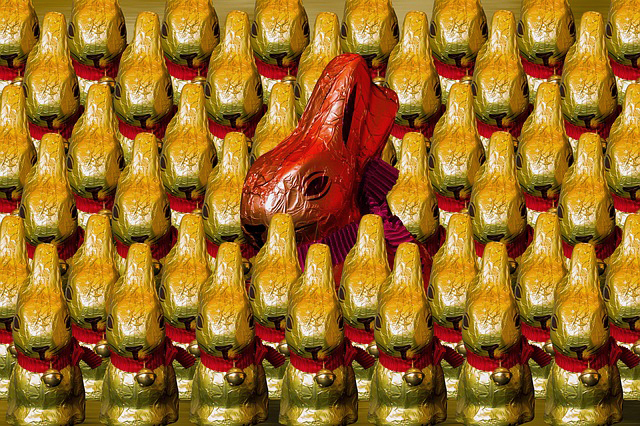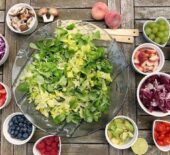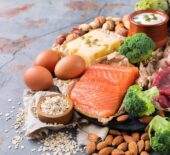With April rapidly approaching so is Easter and the time of Easter which normally involves chocolate. Should you hide yourself away from the celebrations and kick the Easter goodbye? Good news is not necessarily.
Yes there are some forms of chocolate with more added sugar, fat content and low cocoa solids content which is definitely a sometimes food and will not do much at all for your waistline and long term health but there is good news. Selecting a chocolate with at least 60% cocoa solids can be included in your diet, without guilt and enjoyed in moderation, as part of a healthy lifestyle. Yes, you still need to understand that this is still a chocolate and still has energy and fat, so a ‘healthy lifestyle’ is one of moderate amount of fat, around 20-35% of your daily intake if you are a healthy weight, with most of the fats from the monounsaturated and polyunsaturated forms rather than the saturated and trans fats. A 50 g chocolate provides approximately 230 kcal or 9621kJ, 15 g fat and 27 g total sugars.
It is becoming easier to find chocolate with higher amounts of cocoa solids but you still need to look around in the sweet isle or potential delve into the health food section of your supermarket to find a chocolate with this amount of cocoa solids. Good news is because of the intensity of the taste you will only need a smaller amount to satisfy a chocolate craving and leave you feeling satisfied.
Why is a higher cocoa solid content important? This is linked to a higher flavonoid content. Flavanoids are antioxidants which help protect your body against free radical damage. Studies suggest if you eat around 50-100g a day this may:
- Improve the way your heart cells function
- Decrease your chances of dying of a heart attack
- Reduce blood pressure
Further studies are needed to strengthen these findings and it should be noted again that chocolate still has fat and energy and this can, potentially lead to increased weight gain if not enjoyed in moderation and as part of a healthy diet. The Australian Guide to Healthy Eating suggest you only enjoy a treat like this at most 2 times, to an amount which equals 600kJ or 142kcals a week to be healthy in the long term. If you go overboard and eat everything with the word chocolate on it you may find unpleasant results both on the scales and potentially to your health long term as weight gain, particularly around the middle is linked to increased risk of heart disease and higher blood pressure.
Take home message: Enjoy Easter! Eating is about the experience and this includes the social interaction and connections with other people. Enjoy your chocolate (or two) and if possible ask your special someone to buy you a dark chocolate with at least 60% cocoa solids, this will help keep your taste buds happy and allow you to enjoy a present from the Easter Bunny as well.
References:
- Buijsse B, Feskens EJ, Kok FJ, Kromhout D. Cocoa intake, blood pressure, and cardiovascular mortality. The Zutphen Elderly Study. Arch Intern Med. 2006 Feb 27 [cited 2017 25 Mar];166:411-17. Abstract available from: https://www.ncbi.nlm.nih.gov/pubmed/16505260
- Health Canada. Nutrient value of some common foods. 2009 [cited 2017 26 Mar]. Available from: http://www.hc-sc.gc.ca/fn-an/nutrition/fiche-nutri-data/nutrient_value-valeurs_nutritives-eng.php
- Taubert D, Roesen R, Schömig E. Effect of cocoa and tea intake on blood pressure. A meta-analysis. Arch Intern Med. 2007 Apr 9 [cited 2017 25 Mar];167(7):626-34. Abstract available from: https://www.ncbi.nlm.nih.gov/pubmed/17420419
- Hooper L, Kroon PA, Rimm EB, Cohn JS, Harvey I, Le Cornu KA, et al. Flavonoids, flavonoid-rich foods, and cardiovascular risk: a meta-analysis of randomized controlled trials. Am J Clin Nutr. 2008 Jul [cited 2017 25 Mar];88(1):38-50. Abstract available from: https://www.ncbi.nlm.nih.gov/pubmed/18614722
- Faridi Z, Njike VY, Dutta S, Ali A, Katz DL. Acute dark chocolate and cocoa ingestion and endothelial function: a randomized controlled crossover trial. Am J Clin Nutr. 2008 Jul [cited 2017 25 Mar];88(1):58-63. Abstract available from: https://www.ncbi.nlm.nih.gov/pubmed/18614724








